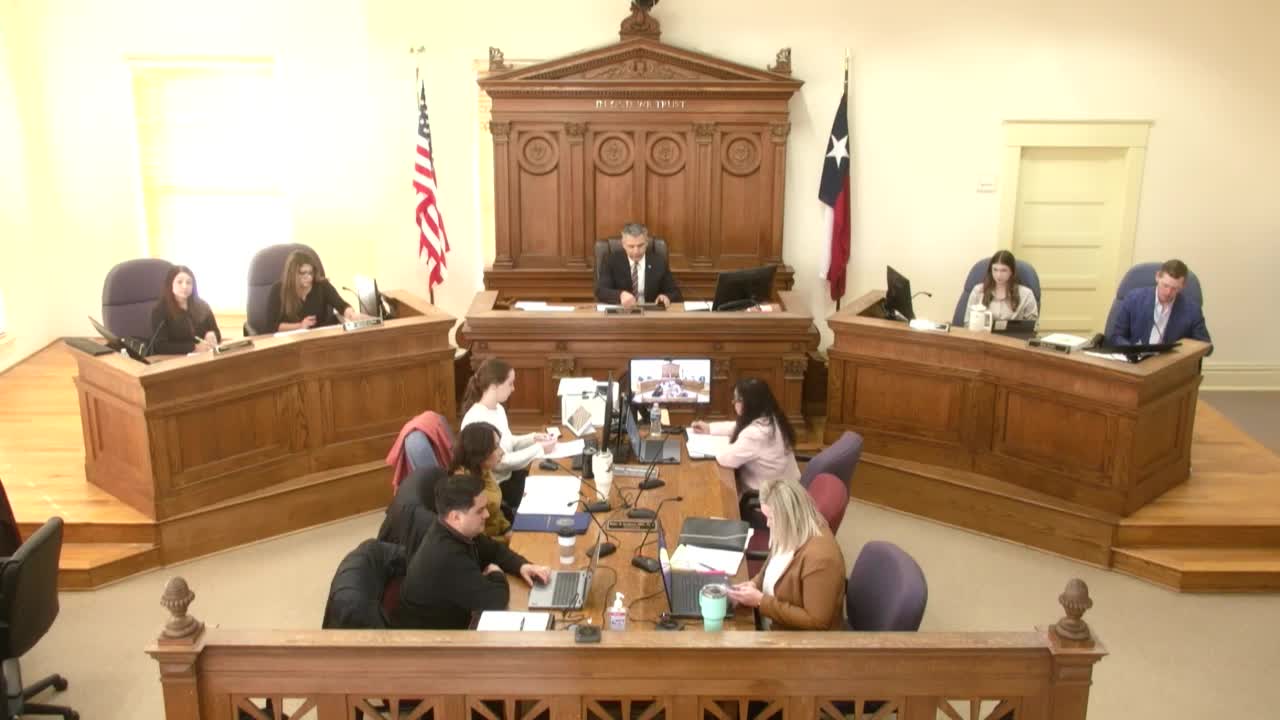Hays County court backs letter supporting jail-based competency restoration after extended debate
Get AI-powered insights, summaries, and transcripts
Subscribe
Summary
Hays County Commissioners unanimously approved a letter of support to Hill Country MHDD Centers for a proposed jail‑based competency restoration (JBCR) program after public comment and discussion about treatment, diversion and oversight.
HAYS COUNTY, Texas — The Hays County Commissioners Court voted unanimously Jan. 7 to send a letter of support to Hill Country MHDD Centers for a proposed jail‑based competency restoration program aimed at shortening wait times to restore criminal defendants’ competency.
Supporters, including the county’s criminal district attorney and the local mental‑health authority, described the program as a way to move people off long state hospital waits and into restoration services more quickly. Opponents warned the program could further criminalize people with serious mental illness unless the county pairs JBCR with stronger community treatment and discharge planning.
The court’s vote authorizes three elected offices to send a support letter to Hill Country MHDD Centers. The motion was made by Commissioner Cohen and carried on a roll call vote with Commissioners Inglesby, Smith, Hammer and Judge Ruben Becerra voting yes.
Why it matters: People found incompetent to stand trial are often held in county jails while awaiting placement at state hospitals for restoration. Several speakers told the court those waits can be months or more; the county’s prosecutor and mental‑health partners said JBCR programs run by local authorities can shorten that time from many months to weeks in other Texas counties.
What speakers told the court - Karen Muñoz, a civil‑rights attorney who has testified before the state legislature and reviewed JBCR curricula, told the court competency restoration is “narrowly focused on stabilization, symptom management, and required legal education” and argued JBCR “is not about treatment” and risks further criminalizing people with mental illness. She urged the court to ask whether the local mental‑health authority connects people with services before release.
- Kelly Higgins, Hays County criminal district attorney, said she has pushed for JBCR since taking office two years ago and called the existing system “the worst possible arrangement.” Higgins said long waits to reach state hospitals — she cited waits she’d seen of many months — deprive people of timely care and keep cases stalled. She said Williamson County’s JBCR program averaged about 40 days to restoration and that, for her office, quicker restoration enables appropriate case resolution, not automatic prosecution: “To restore someone is to say good, now we can take a look at this case, talk about what the best resolutions are in light of a mental‑health diagnosis.”
- Landon Campbell, the court’s misdemeanor chief, said line prosecutors use diversion pathways and specialty courts that require competency; without restoration they cannot move people into those programs. He said “giving someone a ‘time served’ conviction ... and not dealing with their actual issues just means that they’re back in front of us next week and we haven’t done anything.”
- Tucker Furlough, assistant district attorney, and Hill Country MHDD clinical leaders said the local mental‑health authority will provide required discharge planning and clinical services within JBCR programs. Anthony Winn, Hill Country MHDD director of clinical operations, said the authority’s goal “is to care for individuals wherever they are” and highlighted the program’s required discharge planning component.
Public comment and concerns Several public commenters and advocates urged caution. Sam Benavides, a community mental‑health advocate, said JBCR risks “systemiz[ing] and cement[ing] the practice of criminalizing mental health issues” and asked the court to prioritize meeting people’s basic needs rather than expanding carceral responses. Muñoz and another speaker described cases in which individuals released after “timing out” of the state hospital wait list rapidly cycled back into jail.
Court directions and next steps The court’s action was limited to a letter of support for Hill Country MHDD’s application; no contract or program implementation was approved on Jan. 7. During the discussion, Assistant DA Tucker Furlough said his office would draft and negotiate any subsequent agreement with Hill Country and that the court would review the contract before final approval. The sheriff’s office provided a letter of support and county mental‑health and specialty court leaders said they will work collaboratively on discharge planning and referrals.
Remaining questions Speakers and several commissioners pressed for more local data about the county’s forensic population and connections to local services, asking whether local mental‑health services reach people before arrest and where gaps exist. Several commissioners said oversight, contract details and measurable discharge planning were essential if JBCR proceeds beyond the support letter stage.
The court’s vote does not authorize funds for JBCR. Any funding requests, contracts with Hill Country MHDD Centers, or program implementation plans will return to the court for separate review and approval.
